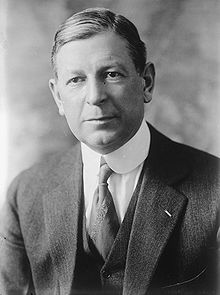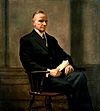Dwight F. Davis
Dwight F. Davis | |
|---|---|
 | |
| Governor-General of the Philippines | |
| In office July 8, 1929 – January 9, 1932 | |
| President | Herbert Hoover |
| Preceded by | Eugene Allen Gilmore (acting) |
| Succeeded by | George C. Butte (acting) |
| 49th United States Secretary of War | |
| In office October 14, 1925 – March 4, 1929 | |
| President | Calvin Coolidge |
| Preceded by | John W. Weeks |
| Succeeded by | James Good |
| United States Assistant Secretary of War | |
| In office 1923–1925 | |
| Appointed by | Calvin Coolidge |
| Preceded by | Mayhew Wainwright |
| Succeeded by | Hanford MacNider |
| Personal details | |
| Born | Dwight Filley Davis July 5, 1879 St. Louis, Missouri, U.S. |
| Died | November 28, 1945 (aged 66) Washington, D.C., U.S. |
| Political party | Republican |
| Spouse(s) |
Helen Brooks
(m. 1905; died 1932) |
| Education | Harvard University (BA) Washington University (LLB) |
Tennis career | |
| Turned pro | 1895 (amateur tour) |
| Retired | 1902 |
| Plays | Left-handed (one-handed backhand) |
| Int. Tennis HoF | 1956 (member page) |
| Singles | |
| Highest ranking | No. 5 (1900) |
| Grand Slam singles results | |
| US Open | F (1898, 1899) |
| Other tournaments | |
| Olympic Games | 2R (1904) |
| Doubles | |
| Grand Slam doubles results | |
| Wimbledon | F (1901) |
| US Open | W (1899, 1900, 1901) |
| Other doubles tournaments | |
| Olympic Games | QF (1904) |
| Team competitions | |
| Davis Cup | W (1900, 1902) |
Dwight Filley Davis Sr. (July 5, 1879 – November 28, 1945) was an American tennis player and politician. He is best remembered as the founder of the Davis Cup international tennis competition. He was the Assistant Secretary of War from 1923 to 1925 and Secretary of War from 1925 to 1929.[1]
Early life
[edit]
Dwight Filley Davis was born in St. Louis, Missouri, on July 5, 1879. His grandfather, Oliver Dwight Filley, was mayor of St. Louis from 1858 to 1861.[2] A cousin, Chauncey Ives Filley, served as mayor of St. Louis from 1863 to 1864.[3]
Tennis
[edit]He reached the All-Comers final for the Men's Singles title at the US Championships in 1898 and 1899. He then teamed up with Holcombe Ward and won the Men's Doubles title at the championships for three years in a row from 1899 to 1901. Davis and Ward were also Men's Doubles runners-up at Wimbledon in 1901. Davis also won the American intercollegiate singles championship of 1899 as a student at Harvard College.
Davis Cup
[edit]In 1900 Davis developed the structure for, and donated a silver bowl to go to the winner of, a new international tennis competition designed by him and three others known as the International Lawn Tennis Challenge, which was later renamed the Davis Cup in his honor. He was a member of the US team that won the first two competitions in 1900 and 1902, and was also the captain of the 1900 team.
He participated in the 1904 Summer Olympics. He was eliminated in the second round of the singles tournament. In the doubles tournament he and his partner Ralph McKittrick lost in the quarter-finals.[4]
He was inducted into the National Tennis Hall of Fame (now known as the International Tennis Hall of Fame) in 1956 in recognition of his contributions to the sport both as a player and an administrator.
Political service
[edit]
After Harvard Davis attended Washington University School of Law, though he was never a practicing attorney. He was, however, politically active in his home town of St. Louis and served as the city's public parks commissioner from 1911 to 1915. During his tenure, he expanded athletic facilities and created the first municipal tennis courts in the United States. He sought the Republican nomination in the 1920 Missouri Senate election, receiving 38.2% in the primary.[5][6] He served under President Calvin Coolidge as Assistant Secretary of War (1923–1925) and as Secretary of War (1925–1929). He then served as Governor General of the Philippines (1929–1932) under Herbert Hoover.
Army service
[edit]Davis trained at the Preparedness Movement Citizens' Military Training Camp in 1915. From 1916 to 1917 he toured Europe as part of the Rockefeller War Relief Board. With war declared Davis enlisted as a private in the Missouri National Guard and was commissioned in August 1917.[7]
Going to France, Davis was promoted to Major and became adjutant of the 69th Infantry Brigade of the 35th Infantry Division. During this period he was awarded the Distinguished Service Cross. After the war he was a Colonel in the Army Reserves.
In 1942 Davis was the first and only Director General of the short lived Army Specialist Corps.[8] On the disbandment of the unit became an advisor with the rank of Major General.[7]
Personal life
[edit]Davis’ first wife, Helen Brooks, whom he married in 1905, died in 1932.[9] He married Pauline Sabin in 1936.
His daughter Alice Brooks Davis was married to the British Ambassador to the United States Sir Roger Makins. Another daughter, Cynthia Davis, was married to banker William McChesney Martin Jr., the longest-serving Federal Reserve director (1951–1970) who served under five presidents (Truman to Nixon).
He wintered in Florida from 1933 until his death, living at Meridian Plantation, near Tallahassee.[10]
Death
[edit]Davis died at his home in Washington, D.C., on November 28, 1945, after a six-month illness.[9][11] He was buried at Arlington National Cemetery.[12]
Distinguished Service Cross citation
[edit]War Department, General Orders No. 9 (1923)
CITATION: The President of the United States of America, authorized by Act of Congress, July 9, 1918, takes pleasure in presenting the Distinguished Service Cross to Major (General Staff Corps) Dwight Filley Davis, United States Army, for extraordinary heroism in action while serving with Adjutant, 69th Infantry Brigade, 35th Division, A.E.F., between Baulny and Chaudron Farm, France, September 29 - 30, 1918. After exposure to severe shelling and machine-gun fire for three days, during which time he displayed rare courage and devotion to duty, Major Davis, then Adjutant, 69th Infantry Brigade, voluntarily and in the face of intense enemy machine-gun and artillery fire proceeded to various points in his brigade sector, assisted in reorganizing positions, and in replacing units of the brigade, this self-imposed duty necessitating continued exposure to concentrated enemy fire. September 38, 1918, learning that a strong counterattack had been launched by the enemy against Baulny ridge and was progressing successfully, he voluntarily organized such special duty men as could be found and with them rushed forward to reinforce the line under attack, exposing himself with such coolness and great courage that his conduct inspired the troops in this crisis and enabled them to hold on in the face of vastly superior numbers.[13]
Legacy
[edit]Davis was honored with a star on the St. Louis Walk of Fame.[14]
References
[edit]- ^ "Dwight F. Davis". Olympedia. Retrieved February 21, 2021.
- ^ "Dwight Filley Davis Family Tree".
- ^ . Encyclopedia Americana. Vol. XI. 1920.
- ^ "Dwight F. Davis Olympic Results". sports-reference.com. Archived from the original on February 1, 2014. Retrieved January 27, 2014.
- ^ "RECORD OF CANDIDATES WHO ARE LOOKING FOR SENATORIAL HONORS". St. Louis Post-Dispatch. St. Louis, Missouri. August 1, 1920. p. 3B. Retrieved July 23, 2023 – via State Historical Society of Missouri.
- ^ Official Manual of the State of Missouri 1921 - 1922. Missouri Secretary of State's Office. 1922. p. 490. Retrieved July 23, 2023.
- ^ a b Sobel, Robert Biographical Directory of the United States Executive Branch, 1774–1989 Greenwood Publishing Group, 1990, p. 94 [ISBN missing]
- ^ "Specialist Corps Formed", Popular Science October 1942, p. 96
- ^ a b "Political Graveyard Genealogies". Archived from the original on January 1, 2011. Retrieved November 28, 2010.
- ^ "Davis Cup has local tie". Tallahassee Democrat, 6 December 2007: 3C
- ^ "Dwight Davis Dies. War Ex-Secretary. Member of Coolidge's Cabinet. First Soldier to Hold Post Since '69. New Deal Foe. Donor Of The Tennis Cup. Former Champion Himself, He Created International Trophy. Hero of First World War. Succeeded John W. Weeks. Twice Double Champion. Sold Progress in Philippines". The New York Times. Associated Press. November 29, 1945.
- ^ Burial Detail: Davis, Dwight F – ANC Explorer
- ^ "Dwight Davis - Recipient -".
- ^ St. Louis Walk of Fame. "St. Louis Walk of Fame Inductees". stlouiswalkoffame.org. Archived from the original on October 31, 2012. Retrieved April 25, 2013.
External links
[edit]![]() Media related to Dwight Filley Davis at Wikimedia Commons
Media related to Dwight Filley Davis at Wikimedia Commons
- 1879 births
- 1945 deaths
- Military personnel from St. Louis
- 19th-century American sportsmen
- 19th-century male tennis players
- 20th-century United States government officials
- American athlete-politicians
- American male tennis players
- Burials at Arlington National Cemetery
- Coolidge administration cabinet members
- Davis Cup
- Founders of sporting institutions
- Governors-general of the Philippine Islands
- Grand Slam (tennis) champions in men's doubles
- Harvard Crimson men's tennis players
- Harvard College alumni
- History of tennis
- International Tennis Hall of Fame inductees
- Missouri National Guard personnel
- Missouri Republicans
- Olympic tennis players for the United States
- Organization founders
- Recipients of the Distinguished Service Cross (United States)
- Tennis players from St. Louis
- Tennis players at the 1904 Summer Olympics
- United States National champions (tennis)
- United States Army colonels
- United States Army reservists
- United States Assistant Secretaries of War
- United States secretaries of war
- Washington, D.C., Republicans
- Washington University School of Law alumni
- United States Army personnel of World War I
- United States Army generals of World War II
- United States Army generals
- Washington University in St. Louis alumni
- 20th-century American sportsmen
- Mary Institute and St. Louis Country Day School alumni
- Presidents of the United States Tennis Association
- Phi Delta Theta members




